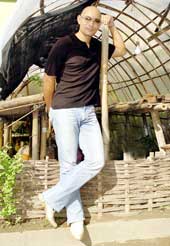 |
| Deepa takes a walk in the zoo |
May 12: Three-and-a-half year-old Deepa will visit the College of Veterinary Sciences tomorrow for an X-ray. It will be a short journey from her enclosure in the zoo to the X-ray table but she is not unduly worried.
Neither are the experts at the College of Veterinary Sciences intimidated at the prospect of conducting an X-ray on the 350-kg elephant. But it is the post-operative care, in case she needs a surgery, that worries them.
Deepa had slipped and fallen in the zoo on February 13, 2003, divisional forest officer of the Assam State Zoo, Narayan Mahanta, said. Her leg was plastered and she was put under medication. Gradually, the elephant could walk again.
“But a problem with her left forelimb remained, as a result of which she has to bend her leg and take the support of her trunk while walking. We thought it would be better to get her checked thoroughly by experts and find out exactly what is wrong,” Mahanta added.
K.K. Sharma of the College of Veterinary Sciences said: “We will conduct an X-ray on her and find out whether she requires surgery or not. There might be contraction of a ligament”.
Sharma and another vet, Bijoy Dutta, inspected the animal at the zoo today and suggested an X-ray.
Sharma said the elephant’s size was not a problem as animals weighing almost 6,000 kg had also been operated on at the college. What he was more worried about was the post-operative care, as animals start moving around after surgery, unlike human beings.
Deepa was rescued from Deepor Beel on September 15, 2000 when she was just a month old. She was slightly weak at that time. She was brought to the zoo, where she has lived ever since. The elephant is the first big animal to be sent outside the zoo for medical care.
Deepa measures 1.6 metres in length and 1.3 metres in height. Her daily meal consists of 50 kg of fine grass, two banana plants, four kg bananas and three kg carrots.
The state government has constituted a health advisory committee at the zoo for better check-up of animals. Altogether 43 animals had died in the Assam State Zoo in 2002-03, including 33 mammals, eight birds and two reptiles. Death due to senility accounted for 0.8 per cent, diseases for 5 per cent, infighting for 3.1 per cent and accidents for 0.2 per cent.










